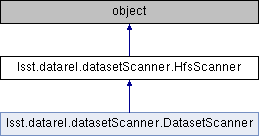Inheritance diagram for lsst.datarel.datasetScanner.HfsScanner:

Public Member Functions | |
| def | __init__ |
| def | walk |
Private Attributes | |
| _formatKeys | |
| _pathComponents | |
Detailed Description
A hierarchical scanner for paths matching a template, optionally also restricting visited paths to those matching a list of dataId rules.
Definition at line 206 of file datasetScanner.py.
Constructor & Destructor Documentation
| def lsst.datarel.datasetScanner.HfsScanner.__init__ | ( | self, | |
| template | |||
| ) |
Build an FsScanner for given a path template. The path template should be a Python string with named format substitution specifications, as used in mapper policy files. For example: deepCoadd-results/%(filter)s/%(tract)d/%(patch)s/calexp-%(filter)s-%(tract)d-%(patch)s.fits Note that a key may appear multiple times. If it does, the value for each occurrence should be identical (the formatting specs must be identical). Octal, binary, hexadecimal, and floating point formats are not supported.
Definition at line 210 of file datasetScanner.py.
_pathComponents
Definition: datasetScanner.py:230
 1.8.5
1.8.5